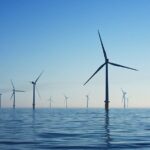
by Bill O’Keefe
Virginia’s Clean Economy act requires Dominion to provide a 100% carbon-free grid by 2045. This law represents a big gamble that Dominion embraced with a “balls to the wall” enthusiasm because the $9 billion cost, which will most likely be higher, will be provided by rate payers, not share owners. To quote a truism, nobody spends someone else’s money like their own. This legislation proves it.
Dominion’s confidence in achieving the General Assembly’s mandate is unrealistic. Given technological uncertainties, it is the height of folly to accept a mandate that establishes a goal and the date by which it is must be achieved. The history of technology-forcing mandates is a sorry one.
Dominion has touted the recent tests of two offshore turbines as reason for optimism for the planned project of 180 to 220 turbines located 27 miles offshore will cover 112,800 acres. That represents 176 square miles, roughly the size of King George County and more than three times as large as Norfolk. And the turbines will stand 600 feet about the surface.
The technology for building large turbine platforms and wind turbines is not new but the combined engineering challenges are significant. The area of the Atlantic where these turbines will be built could be called “hurricane alley” according to one analysis. As such, the wind towers and blades have to be engineered to withstand category five hurricanes—sustained wind speeds of more than 150 miles per hour with gusts of 200 miles per hour. No wind tower has been built to do that. Indeed, the Energy Information Administration (EIA) has a research program to determine if hurricane proof tower designs are possible. Research is also necessary to determine the best floating turbine to install and how to anchor it to the sea floor. The long blades and turbine engines present other engineering challenges. Blades are subject to serious corrosion from salt water and the constant exposure to wind, both of which reduce their efficiency. Since the turbines can run 24 hours a day, seven days a week, they require precision manufacturing. A Forbes article stated that “running a wind turbine for 20 years is analogous to getting 3 million miles from a car engine.” The transmission cables will be buried and have to safely cover more than 27 miles from their location to Dominion’s load centers.
Since production capacity of offshore turbines is 50%-58% according to EIA, Dominion will also have to invest in storage batteries on a scale that does not now exist. Dominion is experimenting with lithium-ion batteries as part of a program to understand this emerging technology but lithium-ion batteries have known limitations and should be old technology in 25 years.
While the General Assembly and Dominion pledge to control rate payer costs, that promise is a triumph of hope over experience. European experience over the past decade has demonstrated that performance of offshore turbines degrades rapidly, which increases maintenance costs. A review of Dominion’s plan by the State Corporation Commission led to the conclusion that Dominion’s own analysis had found that “a larger full-scale offshore wind generation facility, which the [pilot] project is intended to demonstrate, is not expected to be economically competitive with other options for the next 25 years under any scenario studied.” This was confirmed by EIA which has estimated that the cost of offshore wind will be three times greater than the benefits produced. It also concluded that the cost pf gas-fired combined cycle units will be half that of offshore wind generated electricity.
There are only two reasons why the General Assembly would mandate such a costly boondoggle — ideology and a disregard for the economic interests of the Commonwealth’s citizens. It’s not too late for the General Assembly to change course and introduce a dose of realism into our energy policy.
Over 50 years ago, the late James Schlesinger — former secretary of energy and defense, and director of the CIA — wrote an insightful article on planning in which he addressed the degree of confidence that can be assigned to a forecast of the future. He distinguished between two types of planning. One he called “Cook’s tour” planning, which is based on the assumption that the future is sufficiently well known to allow planning a precise course years into the future. The General Assembly and Dominion have adopted this model. The other approach is called “Lewis and Clark” planning, which acknowledges that there are alternative courses of action but the precise character or timing cannot be known with certainty. This approach prepares for uncertainty by identifying alternatives, learning with experience and then acting along the way.
If the General Assembly had used the Lewis-and-Clark model, it would have set interim goals to move towards zero emissions and then let Dominion figure out the most cost-effective approach to achieving it with interim progress reviews. A combined cycle natural gas unit uses both a gas and a steam turbine together to produce up to 50 percent more electricity from the same fuel than a traditional simple-cycle plant. Natural gas in a combined-cycle power plant provides the least CO 2 emissions per kWh of any fossil-fuel fired power plant, around 0.4 tons of CO 2 per megawatt-hour. However, new processes are being developed and tested that involve burning fossil fuel with oxygen instead of air to produce electricity without producing carbon dioxide (CO2) emissions.
Dominion is aware of this but is more concerned about its profits and the goodwill of the General Assembly and the environmental community. Science, economics, and common sense are buried when ideology rules as it did with the Clean Economy Act. But actions have consequences and when these become more obvious, the legislative ideologues will be looking for new employment and Dominion will change course as rapidly as it can.
William O’Keefe, a Midlothian resident, is founder of Solutions Consulting and former EVP American Petroleum Institute.

Leave a Reply
You must be logged in to post a comment.